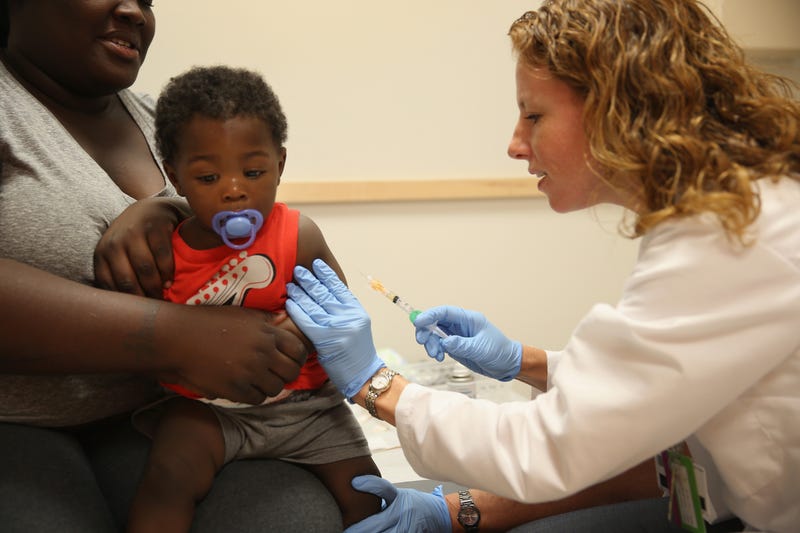
PHILADELPHIA (KYW Newsradio) — City health officials are warning that there has been a cluster of measles cases in the last few weeks and they’re urging residents to take steps to protect themselves and others.
Health Commissioner Cheryl Bettigole says such outbreaks are extremely rare.
“It looks like our last case in Philadelphia, we think, was 2018. There was a big cluster in 1990. But last year, to give you an example, there were 41 cases of measles in the country.”
As of Jan. 8, 2024, there are eight confirmed cases — seven in Philadelphia and one outside.
Bettigole is warning unvaccinated people that they may have been exposed to the virus at Thomas Jefferson University Hospital on Chestnut Street in Center City on Dec. 19 or in the emergency rooms at CHOP, St. Christopher's Hospital for Children, or Nazareth Hospital over the holidays.
Bettigole says the original two suspected cases are the result of a family disregarding quarantine instructions and sending a patient to day care at the Multicultural Education Station on Castor Avenue.
Exact dates and times of potential exposure
Jefferson Health
33 South Ninth Street / 833 Chestnut Street
Exposures took place on Dec. 19 between 2 p.m. and 5:30 p.m.
Multicultural Education Station Day Care
6919 Castor Avenue
Exposures took place on Dec. 20 and Dec. 21.
Children’s Hospital of Philadelphia, emergency room
3401 Civic Center Boulevard
Exposures took place on Dec. 28. and Jan. 1
St. Christopher's Hospital for Children, emergency department
160 East Erie Avenue
Suspected exposures may have happened overnight Dec. 30 to mid-afternoon Dec. 31.
St. Christopher's Hospital for Children, inpatient unit 5 North
160 East Erie Avenue
Suspected exposures may have happened between Dec. 31 and Jan. 3.
Nazareth Hospital, emergency room
2601 Holme Avenue
Suspected exposures may have happened on Dec. 31 and Jan. 2.
Holy Redeemer Pediatric Urgent Care-Meadowbrook
1648 Huntingdon Pike
Suspected exposures may have happened on Jan. 3 between 3:30 p.m. and 7:30 p.m.
Jefferson Abington Hospital, emergency department
1200 Old York Road
Suspected exposures may have happened on Jan. 3 between 7:15 p.m. and 9:45 p.m.
Symptoms of measles
The first symptoms of measles show one to two weeks after infection:
—High fever
—Cough
—Runny nose
—Red, watery eyes
Tiny white spots may appear inside the mouth two to three days after symptoms begin.
Three to five days after symptoms begin, a rash breaks out, usually starting as flat, red spots on the face at the hairline and spreading downward to the neck, trunk, arms, legs and feet.
When the rash appears, a person’s fever may spike to more than 104° F.
Vaccinations are safe, effective
“We certainly want everyone vaccinated," said Bettigole. "This is a very safe, very effective vaccine. But for people who, for whatever reason, do not get vaccinated, it’s really, really important that they still take measures to protect themselves and protect other people.”
She is urging residents to take precautions to avoid spread.
“Stay home,” she says.
And if you have been exposed and feel sick, you should contact your doctor rather than going directly to an emergency room, where you could expose other people.
“If they need medical attention, to call their doctor first so they can get that medical attention without endangering other people,” she said.
Bettigole says measles is very contagious and can be deadly for babies because they cannot be immunized until the age of one. She urges families to make sure children get the full vaccine by the time they’re six.
Unfortunately, says CHOP’s Dr. Paul Offit, about 93% of kids in the U.S. under the age of five are getting their childhood vaccinations, and that number is declining.
“About 25% of parents are starting to push back on school mandates. So they’re choosing non-medical exemptions like religious exemptions or philosophical exemptions,” said Offit, director of the Vaccine Education Center at CHOP and author of the book “Tell Me When It’s Over.”
He says diseases that have been eradicated in the U.S. could have a resurgence because of parents who distrust vaccines following the politically contentious COVID-19 vaccination mandates of recent years. The CDC says only 5% of children under the age of 5 are up to date on their COVID vaccinations.
“People are pushing back on not only COVID vaccine mandates but now all vaccine mandates, including school vaccine mandates — and if we do that, if we push back on school vaccine mandates, we will start to see some of these diseases coming back.”
Offit says pediatric hospitals are overwhelmed every winter with respiratory illnesses, and a drop in immunizations will only make matters worse.
“The frustrating thing for those of us that work in children’s hospitals is a lot of these diseases are preventable. You can prevent COVID you can prevent influenza and now you can prevent RSV.”
He says the misinformation about vaccinations is dangerous.
“To believe that vaccines cause some of the harms that are claimed by anti-vaccine activists, you would have to believe there is a vast, worldwide conspiracy involving hundreds of thousands of people to hide the truth — which is not reasonable.”
He says humans live 30 years longer than they did 100 years ago because of vaccinations, and he urges parents to act before it’s too late.
“I think we all sort of live in this state of denialism. We assume it’s never going to happen to us until it happens to us,” he said. “There are preventable illnesses.”
